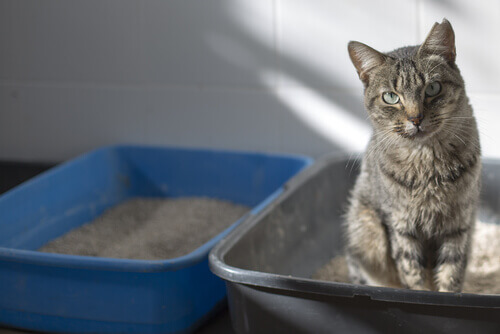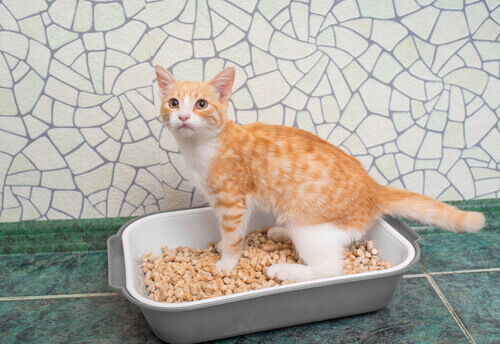What If Your Cat Sleeps in the Litter Box?

Cats have been known to do things that are out of the ordinary, such as sleeping in their litter box. This isn’t appropriate behavior, so here are some reasons for this problem and possible ideas of what to do if your cat sleeps in the litter box.
If your cat sleeps in the litter box, take note of what they’re doing there before and after they do it. Is your cat using the litter box and then staying in? Or are they not using the litter box, but hanging out and resting? Or are they on high alert?
There are many reasons for a cat to sleep there. Evaluating the context of your cat’s strange litter box behavior will help you find a solution.
Rule out disease
The first thing to do is rule out disease. If your cat sleeps in the litter box, pay attention to other routine behavior:
- Are they not getting up to eat, behaving lethargically, or ignoring their favorite view out the window?
- Is your cat using the litter box, but straining or going frequently?
Any of these symptoms could mean that your cat isn’t feeling well and is using the litter box as a source of comfort (even if it’s just to keep the toilet close by).
Go to the veterinarian and have your cat checked out. Report the abnormal behavior and mention any facts that will help pinpoint the diagnosis.

Pregnancy
If your cat is female and not spayed, ask your veterinarian to check if she’s pregnant, especially if she goes outdoors. Or if you know that your cat’s pregnant, and you see her spending long periods of time in the litter box, she may be looking for a place to have her babies.
Expectant feline mothers seek sheltered places away from household noise and traffic to give birth to their kittens. However, the litter box isn’t an ideal place to birth or are for kittens, as it can lead to disease.
It’s best to prepare a nest with an alternative box for your cat by lining a garbage can or cardboard box with clean, soft towels or blankets.
Place it near the litter box and, once she has relocated to her new, clean litter box, be sure to keep food, water, and the litter box nearby.
What if your cat sleeps in the litter box because of adjustment anxiety?
During periods of transition, such as adding a new pet to the family, having a house guest, undergoing a home remodel, or similar upheaval, your cat may have difficulty relaxing.
In fact, any change in the environment can cause anxiety, anxiety that your cat will try to soothe in a comfortable, protected place, which can be the litter box.

In addition to being located away from the noise and traffic of the house, the litter box has a familiar smell. While the thought may seem unpleasant to you or me, in cats it activates their natural, wild ways. When nowhere else feels like home, the litter box will.
One action to avoid this situation might be the following: watch out for clutter in your cat’s usual haunts and offer them one or two secluded, cozy, clean places in quiet areas. If anxiety is the source of the problem, it won’t be long before your cat finds these new, serene hiding places.
If your cat sleeps in the litter box, it’s because they see it as a refuge
When the house is chaotic, guests produce a great deal of noise, and the kids get out of control, where’s the one place you can go with guaranteed privacy? That’s right, the bathroom. The same goes for your cat!
The litter box is usually in some room or area that’s out of the way and is something that belongs to them and only them. It’s a place where they can take serious naps when there’s no other option.
However, that doesn’t mean that if your cat sleeps in the litter box you should just allow it. The litter box isn’t a sanitary place, of course, so you’ll need to provide a clean, comfortable alternative and place it next to the litter box.
Don’t try too hard to get your cat out of the litter box; just offer them a clean alternative and let them do what they want. Chances are that if shelter was what your cat was looking for in the litter box, they’ll probably find it in the clean, soft box you placed in the same spot.
Cats have been known to do things that are out of the ordinary, such as sleeping in their litter box. This isn’t appropriate behavior, so here are some reasons for this problem and possible ideas of what to do if your cat sleeps in the litter box.
If your cat sleeps in the litter box, take note of what they’re doing there before and after they do it. Is your cat using the litter box and then staying in? Or are they not using the litter box, but hanging out and resting? Or are they on high alert?
There are many reasons for a cat to sleep there. Evaluating the context of your cat’s strange litter box behavior will help you find a solution.
Rule out disease
The first thing to do is rule out disease. If your cat sleeps in the litter box, pay attention to other routine behavior:
- Are they not getting up to eat, behaving lethargically, or ignoring their favorite view out the window?
- Is your cat using the litter box, but straining or going frequently?
Any of these symptoms could mean that your cat isn’t feeling well and is using the litter box as a source of comfort (even if it’s just to keep the toilet close by).
Go to the veterinarian and have your cat checked out. Report the abnormal behavior and mention any facts that will help pinpoint the diagnosis.

Pregnancy
If your cat is female and not spayed, ask your veterinarian to check if she’s pregnant, especially if she goes outdoors. Or if you know that your cat’s pregnant, and you see her spending long periods of time in the litter box, she may be looking for a place to have her babies.
Expectant feline mothers seek sheltered places away from household noise and traffic to give birth to their kittens. However, the litter box isn’t an ideal place to birth or are for kittens, as it can lead to disease.
It’s best to prepare a nest with an alternative box for your cat by lining a garbage can or cardboard box with clean, soft towels or blankets.
Place it near the litter box and, once she has relocated to her new, clean litter box, be sure to keep food, water, and the litter box nearby.
What if your cat sleeps in the litter box because of adjustment anxiety?
During periods of transition, such as adding a new pet to the family, having a house guest, undergoing a home remodel, or similar upheaval, your cat may have difficulty relaxing.
In fact, any change in the environment can cause anxiety, anxiety that your cat will try to soothe in a comfortable, protected place, which can be the litter box.

In addition to being located away from the noise and traffic of the house, the litter box has a familiar smell. While the thought may seem unpleasant to you or me, in cats it activates their natural, wild ways. When nowhere else feels like home, the litter box will.
One action to avoid this situation might be the following: watch out for clutter in your cat’s usual haunts and offer them one or two secluded, cozy, clean places in quiet areas. If anxiety is the source of the problem, it won’t be long before your cat finds these new, serene hiding places.
If your cat sleeps in the litter box, it’s because they see it as a refuge
When the house is chaotic, guests produce a great deal of noise, and the kids get out of control, where’s the one place you can go with guaranteed privacy? That’s right, the bathroom. The same goes for your cat!
The litter box is usually in some room or area that’s out of the way and is something that belongs to them and only them. It’s a place where they can take serious naps when there’s no other option.
However, that doesn’t mean that if your cat sleeps in the litter box you should just allow it. The litter box isn’t a sanitary place, of course, so you’ll need to provide a clean, comfortable alternative and place it next to the litter box.
Don’t try too hard to get your cat out of the litter box; just offer them a clean alternative and let them do what they want. Chances are that if shelter was what your cat was looking for in the litter box, they’ll probably find it in the clean, soft box you placed in the same spot.
This text is provided for informational purposes only and does not replace consultation with a professional. If in doubt, consult your specialist.








